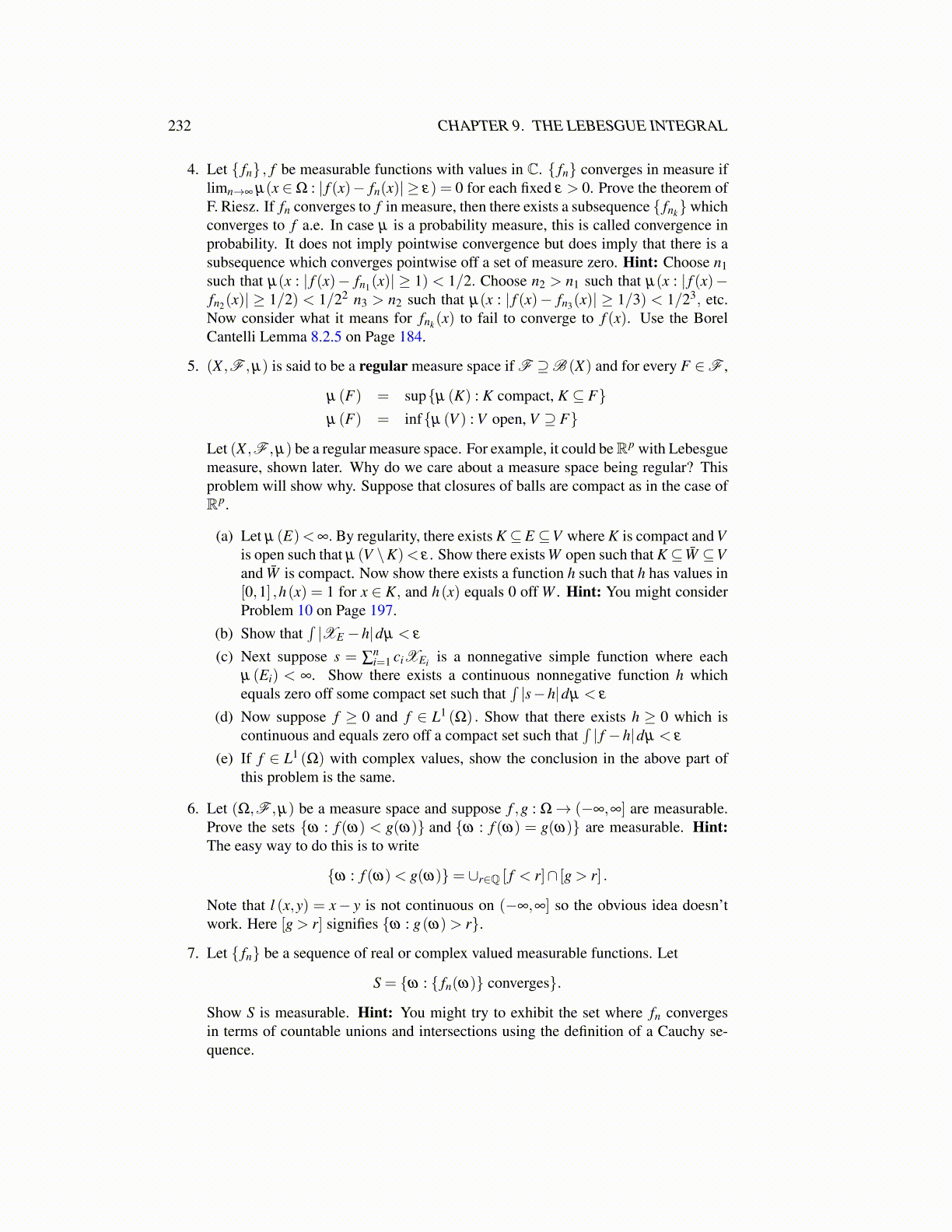
232 CHAPTER 9. THE LEBESGUE INTEGRAL
4. Let { fn} , f be measurable functions with values in C. { fn} converges in measure iflimn→∞ µ(x ∈Ω : | f (x)− fn(x)| ≥ ε) = 0 for each fixed ε > 0. Prove the theorem ofF. Riesz. If fn converges to f in measure, then there exists a subsequence { fnk}whichconverges to f a.e. In case µ is a probability measure, this is called convergence inprobability. It does not imply pointwise convergence but does imply that there is asubsequence which converges pointwise off a set of measure zero. Hint: Choose n1such that µ(x : | f (x)− fn1(x)| ≥ 1) < 1/2. Choose n2 > n1 such that µ(x : | f (x)−fn2(x)| ≥ 1/2) < 1/22 n3 > n2 such that µ(x : | f (x)− fn3(x)| ≥ 1/3) < 1/23, etc.Now consider what it means for fnk(x) to fail to converge to f (x). Use the BorelCantelli Lemma 8.2.5 on Page 184.
5. (X ,F ,µ) is said to be a regular measure space if F ⊇B (X) and for every F ∈F ,
µ (F) = sup{µ (K) : K compact, K ⊆ F}µ (F) = inf{µ (V ) : V open, V ⊇ F}
Let (X ,F ,µ) be a regular measure space. For example, it could beRp with Lebesguemeasure, shown later. Why do we care about a measure space being regular? Thisproblem will show why. Suppose that closures of balls are compact as in the case ofRp.
(a) Let µ (E)<∞. By regularity, there exists K ⊆E ⊆V where K is compact and Vis open such that µ (V \K)< ε . Show there exists W open such that K ⊆ W̄ ⊆Vand W̄ is compact. Now show there exists a function h such that h has values in[0,1] ,h(x) = 1 for x ∈ K, and h(x) equals 0 off W . Hint: You might considerProblem 10 on Page 197.
(b) Show that∫|XE −h|dµ < ε
(c) Next suppose s = ∑ni=1 ciXEi is a nonnegative simple function where each
µ (Ei) < ∞. Show there exists a continuous nonnegative function h whichequals zero off some compact set such that
∫|s−h|dµ < ε
(d) Now suppose f ≥ 0 and f ∈ L1 (Ω) . Show that there exists h ≥ 0 which iscontinuous and equals zero off a compact set such that
∫| f −h|dµ < ε
(e) If f ∈ L1 (Ω) with complex values, show the conclusion in the above part ofthis problem is the same.
6. Let (Ω,F ,µ) be a measure space and suppose f ,g : Ω→ (−∞,∞] are measurable.Prove the sets {ω : f (ω) < g(ω)} and {ω : f (ω) = g(ω)} are measurable. Hint:The easy way to do this is to write
{ω : f (ω)< g(ω)}= ∪r∈Q [ f < r]∩ [g > r] .
Note that l (x,y) = x− y is not continuous on (−∞,∞] so the obvious idea doesn’twork. Here [g > r] signifies {ω : g(ω)> r}.
7. Let { fn} be a sequence of real or complex valued measurable functions. Let
S = {ω : { fn(ω)} converges}.
Show S is measurable. Hint: You might try to exhibit the set where fn convergesin terms of countable unions and intersections using the definition of a Cauchy se-quence.